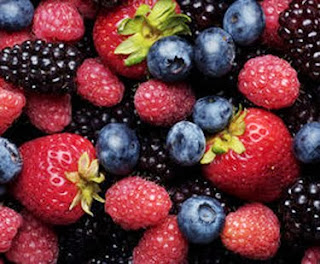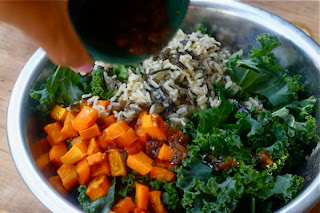Add these to your beauty detox diet plan. The Ultra Beauty blog
shows your how healthy eating will get you Ultra Beautiful in no time
For optimum health and beautiful skin, fruit and vegetables are nature’s powerhouses. Packed full of antioxidants, vitamins, minerals and fibre, they are key to the Ultra Beauty diet. Eat a wide range of fruit and veg and you'll get the full spectrum of micronutrients - and will benefit from glowing radiance.
Current government guidelines recommend eating five different fruit and veg per day, and allow you to count tinned and juice products in that five. Ultra Beauty advises you to eat closer to ten, and these should not include juice, but can include tinned tomatoes (an excellent source of lycopene) and all frozen vegetables.
The ten food heroes should be made up of six or seven servings of vegetables, concentrating on the green variety, with the remaining three or four being fruit. Healthy choices are pretty much always available; don't be afraid to ask to customise a meal or adding sides of greens!
 |
| You can always make better beauty food choices, even if you've stepped off a twenty hour flight and have stumbled into a robot restaurant! |
Why ten servings per day?
We believe that is it only possible to achieve optimum, glowing health by consuming a large number of these foods, of which most should be dark green leafy vegetables.
Greens have more valuable nutrients than any other food group on the planet. That much you know already. You might be surprised to learn that greens even have high-quality, easily-assimilated amino acids – in other words, loads of protein!
Looking at the Everyday Maintenance diet, it might seem as though your bank account is going to take a hit from all the fresh produce.
Don’t feel as thought you have to spend half your income on bagged spinach; there are many more affordable solutions. Frozen spinach is around a tenth the price of fresh, and comes in portion-sized balls which you can just throw onto a plate in the morning, to defrost for dinner time. Kale is cheaper than spinach at around £1 for a large bag, and one of the most nutrient dense foods grown. Spring greens are even less expensive and when cooked, are a delicious addition to salads, soups and stews. Just be careful not to overcook them. We're aiming for 'greens', not 'greys'.
 |
| Frozen spinach is mega cheap and so nutritious! Choose whole leaf rather than chopped - it looks and tastes nicer when defrosted. |
Isn’t too much fruit bad?
Let’s be clear. Humans evolved eating tons of fruit. For millions of years of human evolution, fruit has been abundantly available on trees and bushes – the original fast food. Some diets might advise not eating fruit because of the sugar it contains, but in fact the high water content of fruits (between 90 and 95%) means that the sugar is a relatively low component. Choosing a wide range of fruit to add to your diet in the form of snacks and dessert will protect you against illnesses, boost your immune system and keep you full for longer – the best form of bulk there is!
For your skin, the concentration of antioxidants and beta-carotene, plus vitamins A and C mean that your skin will retain elasticity and plumpness, and will get a radiant glow. Lycopene in watermelon, resveratrol in grapes and beta carotene in apricots are just three of the nutrients essential for glowing skin. Each type of fruit contains a different cocktail of nutrients; so try to choose different ones each day.
Below are our favourite fruit and vegetable choices:
You know antioxidants are good for you, and berries are chock-a-block full of them. A quick lesson from NetDoctor on why this is important. Feel free to skip this if you know the score already.
"Your body constantly reacts with oxygen as you breathe and your cells produce energy. As a consequence of this activity, highly reactive molecules are produced known as free radicals.
Free radicals interact with other molecules within cells. This can cause oxidative damage to proteins, membranes and genes.
Oxidative damage has been implicated in the cause of many diseases, such as cancer and Alzheimer's and has an impact on the body's ageing process. External factors, such as pollution, sunlight and smoking, also trigger the production of free radicals."
Therefore, berries are also anti-cancer foods (especially for cancers that occur along the digestive tract). One study says, “Through their ability to scavenge ROS [reactive oxygen species], and reduce oxidative DNA damage, stimulate antioxidant enzymes, inhibit carcinogen-induced DNA adduct formation and enhance DNA repair, berry compounds have been shown to inhibit mutagenesis and cancer initiation.” That basically means berries help protect you against environmental toxins that are all around us.
Eat a mix of raspberries, blackberries, blueberries, acai berries—whatever you can find! Try a new type, be it fresh or frozen - different berries have different specialties. They’re all total powerhouses, packed with flavonoids, vitamins, minerals.
Garlic
Garlic has been shown to inhibit the growth of cancer, especially of the stomach, colon, bladder, and prostate. It’s a strong detoxifier in the body and it revs up the immune system so you’re naturally more able to fight off malignant cancer cells. When your immune system is depressed, those cancer cells are more likely to thrive; garlic keeps the immune system strong.
Ideally, you would eat kale every day!
It’s not just delicious and fibre-rich, it can also help prevent cancer—especially lung, stomach, colon, and rectal cancer. In those potential cancer sites, a study showed a 64 percent inverse association between the likelihood of developing cancer and the consumption of kale and similar vegetables. If you can't find kale, or just don't like it, you can get the same benefits from other members of the brassica and cruciferous veg family, such as cabbage, Brussels sprouts, broccoli, mustards, and cauliflower.
Popeye had it right all along! As a rich source of lutein and beta carotene, this vegetable is a skin favourite. Spinach works to prevent cancer when carcinogens are introduced to the body. And you guessed, it, it also holds powerful anti-cancer properties. In one study, carcinogens (substances that cause cancer) were introduced to two groups of rats via cooked meat. Feeding one group spinach reduced the likelihood of tumor development from 58 percent to 32 percent.
Broccoli Sprouts and Broccoli
Broccoli sprouts and broccoli contain compounds that help the liver detox the body, which is crucial for us optimum beauty seekers. Moreover, scientists have discovered that broccoli and Brussels sprouts have the ability to stop the spread of cancer. Eating the vegetables encourages the body to produce a substance known as 13C (indole-3-carbinol) which fights cancer and blocks cancer cells from proliferating.
In fact there are a wealth of studies adding to the evidence of the anti-cancer and health properties of broccoli and Brussels sprouts. In a study published in 2010 in the Society of Experimental Biology and Medicine, researchers at the Linus Pauling Institute at Oregon State University found that the compound sulforaphane, which is found in cruciferous vegetables such as broccoli, bok choy and Brussels sprouts, has strong anti-cancer properties, particularly when it comes to prostate and colon cancers. Even more promising results have been found with broccoli sprouts, which have more than 50 times the amount of sulforaphane than found in mature broccoli.
A study led by Victoria Kush, Ph.D of Cancer Care Ontario in Toronto and published recently in the Journal of the National Cancer Institute found that greater consumption of dark green and cruciferous vegetables, especially broccoli and cauliflower, was associated with a decreased risk of aggressive prostate cancer.
Mushrooms
Mushrooms can inhibit the growth of hormone-dependent breast cancer by suppressing aromatase (an enzyme that contributes to the conversion of testosterone into estrogen) activity in the body. Shitake mushrooms in particular are often used to boost the immune system as preventative medicine regarding cancer and AIDS.
Mushrooms also contain lentinan, a compound said to slow tumor growth or prevent them from growing at all. In addition, a study in Japan showed that mushrooms decrease the rates of stomach cancer.
Mushrooms can be used in “meat” mixes, combined with seeds or nuts for wrap fillings or salad toppings.
Spring Greens
An affordable, versatile veggie with skin friendly vitamins and cancer-fighting enzymes.
Spring Greens are major detoxifiers, contain large amounts of beta-carotene for healthy, glowing skin, plus they’re anti-inflammatory. Their bitter tast (when raw) is because of the four glucosinolates they contain.
We love them because they make an easy side dish, plus they're sturdy enough to be used in stews and pies.
Tomatoes
The good things packed into tomatoes seriously know no bounds! For ultra beauty, the lycopene in tomatoes has been shown to protect against sun damage to keep skin looking young. Plus, dedicated tomato-munchers have higher levels of pro collagen in their skin, which is the molecule that slows down ageing and gives skin its bounciness. Read this Daily Mail article for more info on this interesting study.
Health-wise, tomatoes have been linked to a decreased risk for cancers, especially lung, stomach, prostate, cervix, breast, oral, pancreatic, colorectal, and oesophageal. This is one fruit I recommend eating cooked, as it is only on exposure to heat that antioxidant lycopene increases.






No comments:
Post a Comment